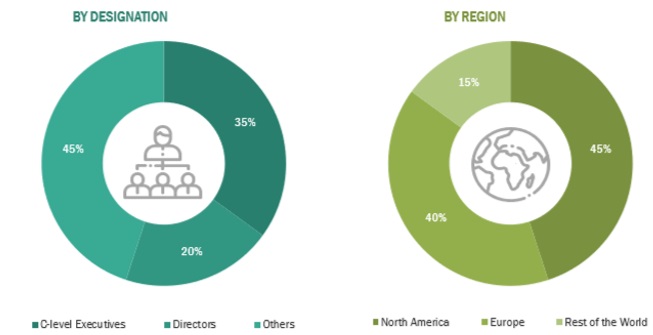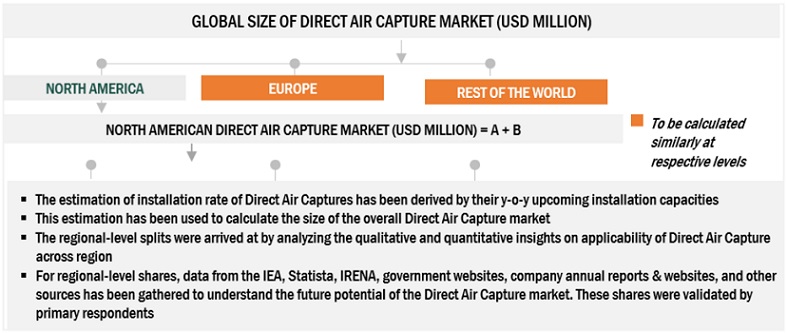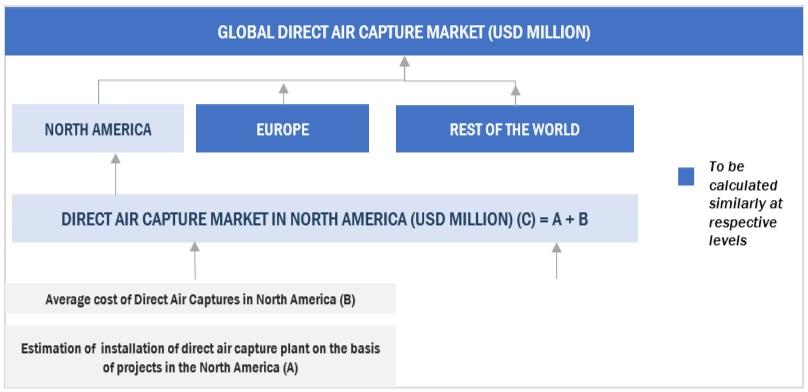The study involved major activities in estimating the current size of the direct air capture market. Exhaustive secondary research was done to collect information on the peer and parent markets. The next step was to validate these findings, assumptions, and sizing with industry experts across the value chain through primary research. Both top-down and bottom-up approaches were employed to estimate the total market size. Thereafter, market breakdown and data triangulation were used to estimate the market size of the segments and subsegments.
Secondary Research
This research study on the dierect air capture market involved the use of extensive secondary sources, directories, and databases, such as Hoover’s, Bloomberg, Factiva, IRENA, International Energy Agency, and Statista Industry Journal, to collect and identify information useful for a technical, market-oriented, and commercial study of the market. The other secondary sources included annual reports, press releases & investor presentations of companies, white papers, certified publications, articles by recognized authors, manufacturer associations, trade directories, and databases.
Primary Research
The direct air captures market comprises several stakeholders, such as direct air capture manufacturers, technology providers, and technical support providers in the supply chain. The demand side of this market is characterized by the rising demand for direct air capture systems in various applications such as carbon capture, and storage (CCS), and carbon capture, utilization, and storage (CCUS). The supply side is characterized by rising demand for contracts from the industrial sector and mergers & acquisitions among big players. Various primary sources from both the supply and demand sides of the market were interviewed to obtain qualitative and quantitative information. Following is the breakdown of primary respondents:

To know about the assumptions considered for the study, download the pdf brochure
Direct Air Capture Market Size Estimation
Both top-down and bottom-up approaches were used to estimate and validate the total size of the market. These methods were also used extensively to estimate the size of various subsegments in the market. The research methodology used to estimate the market size includes the following:
-
The key players in the industry and market have been identified through extensive secondary research, and their market share has been determined through primary and secondary research.
-
The industry’s value chain and market size, in terms of value, have been determined through both primary and secondary research processes.
-
All percentage shares, splits, and breakdowns have been determined using secondary sources and verified through primary sources.
Direct Air Capture Market Size: Top-Down Approach

To know about the assumptions considered for the study, Request for Free Sample Report
Direct Air Capture Market Size: Bottom-Up Approach

Data Triangulation
After arriving at the overall market size from the above estimation process, the total market has been split into several segments and subsegments. Data triangulation and market breakdown processes have been employed to complete the overall market engineering process and arrive at the exact statistics for all the segments and sub-segments, wherever applicable. The data has been triangulated by studying various factors and trends from both the demand- and supply sides. Along with this, the market has been validated using both the top-down and bottom-up approaches.
Market Definition
Direct Air Capture (DAC) is a technology designed to directly extract carbon dioxide (CO2) from the atmosphere, essentially extracting it directly from the air. The captured CO2 can then be securely stored underground or used in diverse applications, presenting a potent tool in combating climate change. When DAC is combined with renewable energy sources to drive the capture process, it has the potential to achieve negative emissions.
Key Stakeholders
-
Energy Regulators
-
Consulting companies in the energy and power sector
-
Institutional investors/shareholders
-
Governments and research organizations
-
Power equipment and garden tool manufacturers
-
Direct air capture technology providers
-
Spare parts and component suppliers
Objectives of the Study
-
To describe, segment, and forecast the direct air capture (DAC) market, by technology, energy source, and application in terms of value
-
To forecast the market across four key regions, namely, North America, Europe, and Rest of the World (RoW), in terms of value and volume
-
To provide detailed information about key drivers, restraints, opportunities, and challenges influencing the market
-
To strategically analyze the market with respect to individual growth trends, prospects, and contributions of each segment to the market
-
To analyze the supply chain, trends/disruptions impacting customer business, market/ecosystem, pricing trends, and regulatory landscape pertaining to solid oxide direct air captures
-
To strategically analyze micromarkets1 with respect to individual growth trends, expansions, and their contribution to the overall market
-
To analyze opportunities for stakeholders in the market and draw a competitive landscape for market players
-
To benchmark players within the market using the company evaluation matrix, which analyzes market players based on several parameters within the broad categories of business and product strategies
-
To analyze the key market players with respect to their market share, product specifications, and applications
-
To strategically profile the key players and comprehensively analyze their market ranking and core competencies2
-
To analyze competitive developments in the market, such as product launches, sales contracts, agreements, investments, expansions, partnerships, and collaborations
Available Customizations:
With the given market data, MarketsandMarkets offers customizations according to the specific requirements of companies. The following customization options are available for the report:
Product Analysis
-
Product Matrix, which provides a detailed comparison of the product portfolio of each company
Company Information
-
Detailed analyses and profiling of additional market players



Growth opportunities and latent adjacency in Direct Air Capture Market